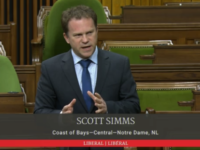Scott Simms, a Liberal MP from Newfoundland for 17 years, was long recognized as a leading voice on Parliament Hill on cultural and digital policy. Simms recently served as the chair of the Standing Committee on Canadian Heritage, which conducted the review of Bill C-10 and which placed him at the heart of one of the year’s more controversial pieces of proposed legislation. Simms was not re-elected this past fall and is now well positioned to reflect on policy making in Canada and the issues that arose with Bill C-10. He joins the Law Bytes podcast for a conversation about the bill, his suggestions for how the process can be improved, and his thoughts on the challenges of crafting forward-looking digital policies.
Latest Posts
The Law Bytes Podcast, Episode 105: NDP MP Charlie Angus on Canada’s Failed Digital Policy and His Hopes for the Next Parliamentary Session
NDP MP Charlie Angus has been a consistent – and persistent – voice on digital policies since his election to the House of Commons in 2004. He was one of the first MPs to seriously consider user rights within Canadian copyright law, a vocal supporter of net neutrality and more affordable wireless services, and a leading advocate for privacy protection and social media regulation.
Last week, Angus called a press conference to unveil his six point plan for digital policy, which emphasized accountability, privacy reform, and algorithmic transparency. Along the way, he derided the government’s Bill C-10 efforts as a political dumpster fire and voiced support for the creation of a new officer of parliament charged with responsibility for social media regulation. Charlie Angus joins the Law Bytes podcast this week to reflect on the failed bill C-10 and C-11, his concerns with the online harms consultation, and his hopes for the coming parliamentary session.
Rabble Radio: What to do about Facebook? Dr. Michael Geist, Canada Research Chair in Internet and E-Commerce Law, talks to Stephen Wentzell
I appeared on the Rabble Radio podcast on October 22, 2021.
In the episode, we discussed the call to regulate social media giants such as Facebook in Canada.
The Law Bytes Podcast, Episode 104: Taylor Owen on What the Latest Facebook Revelations Mean for Canada’s Online Harms Legislative Plans
Facebook has once again found itself in the political spotlight as Frances Haugen, a former data scientist and product manager with the company turned whistleblower, provided the source documents for an explosive investigative series in the Wall Street Journal followed by an appearance before a U.S. Senate committee. The Facebook Files series comes just as Canada is moving toward its own legislative response to Internet concerns, with an online harms consultation that provides a roadmap for future policies.
The Canadian initiative has sparked widespread criticism, but recent events may only increase the calls for legislative action. Taylor Owen, the Beaverbrook Chair in Media, Ethics and Communications in the Max Bell School of Public Policy at McGill University joins the Law Bytes podcast to discuss the latest revelations and what they might mean for the future of Canadian Internet regulation.
The Roy Green Show: FedGov ‘Online Harms Legislation’ challenged by experts. Prof Michael Geist
I appeared on The Roy Green Show on October 9, 2021.
In the episode, we discussed Bill C-10, the broadcast reform package, and its potential implications on the freedom of expression.











